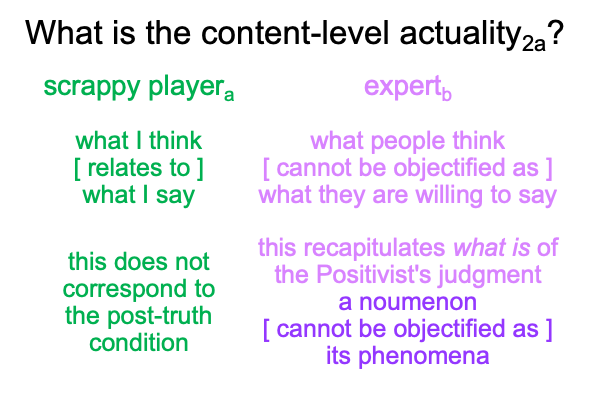0695 I recap.
Here are two key word comparisons between the scrappy playera and the expertb in regards to the post-truth condition.
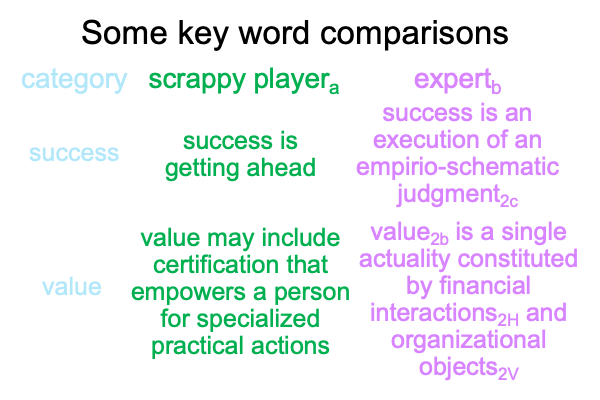
0696 “Success” and “value” are crucial terms.
But, since they are spoken words, they are actualities2 within the normal context of definition3 that arise from the potential of meaning, presence and message1. The nature of spoken words is one of the central concerns of Razie Mah’s masterwork, How To Define The Word “Religion”, available at smashwords and other e-book venues.
Clearly the scrappy player and the expert imbue the same two words with very different meanings, presences and messages. The words sound exactly the same. Each word may be spoken as if they have the same meaning, presence and message. But, the potentials are not the same. The technical definition of words like “success” and “value” benefits the expert and confounds the scrappy player.
Propaganda constitutes a war of words.
0697 Here a picture of the interscope of the post-truth condition.
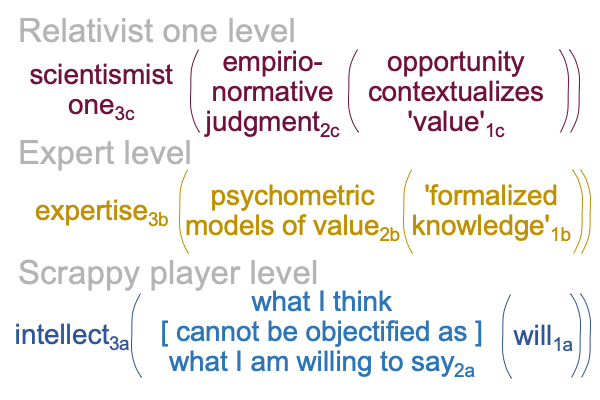
0698 On the scrappy player level, the normal context of the intellect3a brings the dyad, what I think [cannot be objectified as] what I say2a, into relation with the potential of the will1a. The question has been raised. Whose reason3a,1a is involved in any application of the post-truth interscope?
On the expert level, disciplinary-language based expertise3b brings the actuality of psychometric models of value2b into relation with the potential of ‘formalized knowledge’1b.
On the relativist one level, the normal context of the one of scientism3c brings the actuality of an empirio-normative judgment2c into relation with a perspective-level opportunity1c to contextualize value2b.
0699 Here is an example of an application.
An assistant professor3b writes a grant2b, proposing research that will validate a particular valuation2b composed of financial transactions2H that will satisfy certain organizational objectives2V. This grant has the opportunity1c to occupy what ought to be for an empirio-normative judgment2c because it is apparently intelligible (after all, the grant is written by an expert).
0700 But, why would a federal agency3c fund the grant?
Perhaps, they3c have a hidden agenda1c to promote the universality of the particular political topic2c. They want people to encounter the topic2a. Plus, the research2b does not directly reveal the hidden agenda2c of promoting a topic that favors certain financial transactions2H and objectsorg2V. If the research2b promotes the certification of more experts3b that will write more grants1c in this particular academic field, then why not? The agency3c wants the grant2c to operate as an interventional sign-vehicle (SVi) that will impact the way people reason3a,1a and influence what they think2a and what they are willing to say2a. What the granting agency3c wants1c serves as what is for the empirio-normative judgment2c. The relation then becomes rewarding a grant using taxpayer’s money.
0701 Success2c is defined as a federal agency funding the proposed grant (that is, the execution of an empirio-normative judgment).
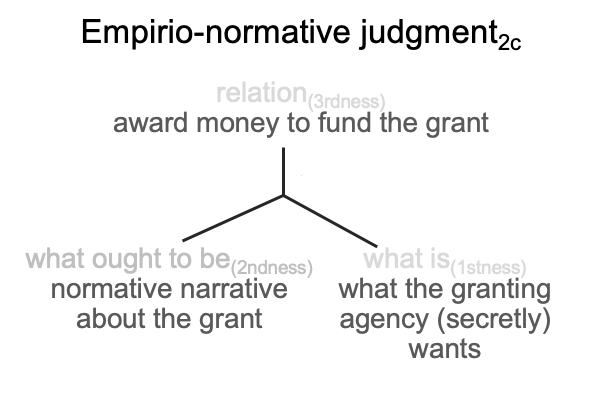
0702 For the scrappy player, formalized knowledge1b includes the why and how of performing specialized and productive tasks. The psychometric expert3b, in contrast, regards formalized knowledge1b, as the observation and measurement1b of social phenomena2a, in regards to a very narrow spectrum of opinion.
Narrow spectrum?
Yes, in the instance of the funded grant, what people say2a becomes phenomena2a when it pertains to what would correspond to the sign-object (SOi) and sign-interpretant (SIi) of an interventional sign-vehicle (SVi) impacting and influencing the scrappy player level.
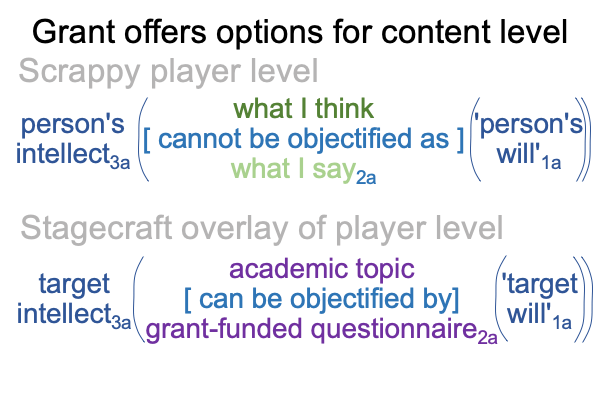
0703 On the scrappy player level, what the player regards as “my” intellect3a brings the actuality of what I think [and] what I am willing to say2a into relation with the possibilities inherent in “my” will1a. In the post-truth interscope, “reason3a,1a” is characterized as “the intellect3a contextualizing the will1a“. “My” becomes “ours”.
0704 Plus, as depicted above, an SVi can impose an SOi and impact a person’s SIi, simply by staging an event2a (here, a questionnaire2a) that produces the possibility of ‘something’ happening1a in the normal context of what is happening3a(corresponding to the content level of the scholastic interscope of how humans think).
0705 This leads to a question that is the topic of chapter ten.
